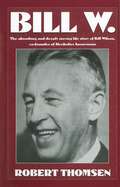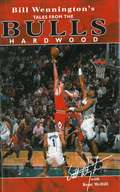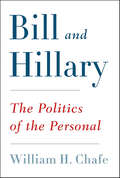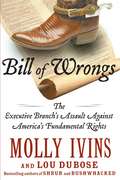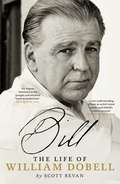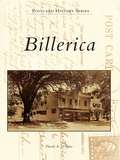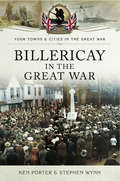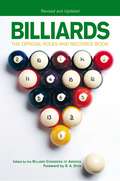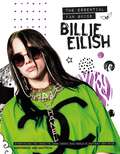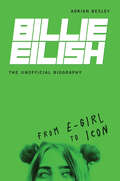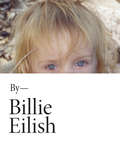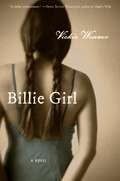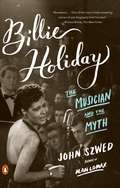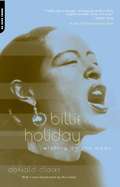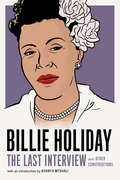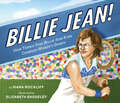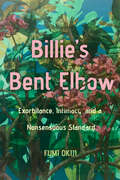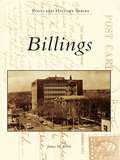- Table View
- List View
Bill W: The absorbing and deeply moving life story of Bill Wilson, co-founder of Alcoholics Anonymous
by Robert ThomsenRobert Thomsen's biography describes the story of Bill W., a stirring spiritual odyssey through triumph, failure, and rebirth, with vital meaning for men and women everywhere.This is the story of a man whose discovery and vision have changed the lives of millions of people throughout the world. Robert Thomsen's biography takes readers through the events of Bill W.'s life, all the while detailing Bill's growing dependence on alcohol. Thomsen writes of the collapse that brought Bill to the verge of death and of the luminous instant of insight that saved him. This turning point led Bill to the encounter in 1935 with Dr. Bob and the start of what was to be a new beginning for countless others who despaired of finding rescue and redemption. Every night at Alcoholics Anonymous meetings around the world, a speaker says, "Our stories disclose in a general way what we used to be like, what happened, and what we are like now." This describes the story of Bill W., a stirring spiritual odyssey through triumph, failure, and rebirth, with vital meaning for men and women everywhere.
Bill Wennington's Tales From the Bulls Hardwood
by Bill WenningtonChicago Bulls fans thought they had it so good. From 1991 through 1993 the Bulls won three consecutive NBA titles behind the talents of Michael Jordan and Scottie Pippen. When Jordan retired in the fall of 1993, those fans thought the good times were over. In the fall of 1995, however, Jordan was ready to make a full return to NBA action, Pippen was still the best number two man in basketball, and then bad-boy Dennis Rodman was signed to join the franchise that had grown to hate him. Suddenly, the Bulls had the greatest team in NBA history. Bill Wennington's Tales from the Bulls Hardwood tells some of the inside stories from that team, the one that won three more NBA titles from 1996 through 1998. Seen from the eyes of three-time NBA champion center Bill Wennington, the Bulls come to life differently, from an insider's point of view. The 1995-96 Bulls won an NBA record 72 games and became the Beatles of professional sports. Followed everywhere and talked about endlessly, they captured a national and international audience and kept all eyes upon them for three seasons, even though everyone knew they were going to win. Fans will read about some of the most famous names in basketball history. Jordan, the demanding team leader; Pippen, the true teammate; Rodman, the reckless rebounder; Toni Kukoc, the outsider; Ron Harper, the former star turned role player; Luc Longley, the affable Aussie; Steve Kerr, the John Paxson sequel; all playing for Phil Jackson, the Zen master coach. These are stories fans have not heard before, but it's not their fault. They just weren't there the way Bill Wennington was.
Bill Wilson: Changing the World
by Robert Simons Max SafferThis case describes the life choices of Bill Wilson, the founder of Alcoholics Anonymous. A young man with tremendous potential, Wilson hit rock bottom as a drunk. An epiphany, coupled with his personal drive, led him to build a worldwide organization that has helped millions of people recover from alcohol addiction. Students will learn how he navigated life's choices to leave a lasting impact on the world.
Bill and Hillary: The Politics of the Personal
by William H. ChafeIn Bill and Hillary: The Politics of the Personal, the distinguished historian William H. Chafe boldly argues that the trajectory of the Clintons' political lives can be understood only through the prism of their personal relationship. Each experienced a difficult childhood. Bill had an abusive stepfather, and his mother was in denial about the family's pathology. He believed that his success as a public servant would redeem the family. Hillary grew up with an autocratic father and a self-sacrificing mother whose most important lesson for her daughter was the necessity of family togetherness. As an adolescent, Hillary's encounter with her youth minister helped set her moral compass on issues of race and social justice.From the day they first met at Yale Law School, Bill and Hillary were inseparable, even though their relationship was inherently volatile. The personal dynamic between them would go on to determine their political fates. Hillary was instrumental in Bill's triumphs as Arkansas's governor and saved his presidential candidacy in 1992 by standing with him during the Gennifer Flowers sex scandal. He responded by delegating to her powers that no other First Lady had ever exercised. Always tempestuous, their relationship had as many lows as it did highs, from near divorce to stunning electoral and political successes.Chafe's many insights—into subjects such as health care, Kenneth Starr, welfare reform, and the extent to which the Lewinsky scandal finally freed Hillary to become a politician in her own right and return to the consensus reformer she had been in college and law school—add texture and depth to our understanding of the Clintons' experience together. The latest book from one of our preeminent historians, Bill and Hillary is the definitive account of the Clintons' relationship and its far-reaching impact on American political life.
Bill of Wrongs: The Executive Branch's Assault on America's Fundamental Rights
by Molly Ivins Lou DuboseIn this, her final and perhaps greatest book, Molly Ivins launches a counterattack on the executive branch's shredding of our cherished Bill of Rights. From illegal wiretaps and the unlawful imprisonment of American citizens to the creeping influence of religious extremism on our national agenda and the erosion of the checks and balances that prevent a president from seizing unitary powers, Ivins and her longtime collaborator, Lou Dubose, describe the attacks on America's vital constitutional guarantees. With devastating humor and keen eyes for deceit and hypocrisy, they show how severe these incursions have become, and they ask us all to take an active role in protecting the Bill of Rights. Praise forBill of Wrongs : "Should make anyone laugh, cheer and roar with rage. " -New Orleans Times-Picayune "[Molly Ivins is] wonderfully direct about the costs of our lost civil liberties. . . . Ivins' voice-in all its drawling, acerbic, storytelling, fearless glory-is stilled now. . . . But her message lives on. And every thoughtful American ought to be listening. " -The Buffalo News "With her characteristic acerbic humor, Ivins and colleague Dubose dissect the myriad attacks the Bush administration has made on the Bill of Rights and how ordinary citizens have fought back. " -Booklist "Ivins' own description of the book is spot-on: 'a hopeful and gladsome romp through some serious terrain. " -The New York Observer "A truly compelling read . . . filled with devastating humor and razor-sharp commentary. " -Austinist
Bill: The Life of William Dobell
by Scott BevanIn post-war Australia, William Dobell was a household name. But the most famous artist in the land was a broken man.His Archibald Prize-winning portrait of Joshua Smith was the subject of a sensational legal case, challenging not only Dobell's right to the prize, but the very idea of art itself. Dobell won the legal battle but lost so much else. His health was shattered, and his desire to paint was wiped out. He had to get away.Just north of Sydney, Wangi Wangi is far removed from big city life. Dobell moved to Wangi to escape fame, but in that beguiling little place he found community and friendship, and he rediscovered the passion to paint - and the joy of life.Through years of research and interviews with Dobell's friends and long-time locals, acclaimed author and former Wangi resident Scott Bevan discovered how the village protected the artist, cared and posed for him, drank and partied with him. Wangi loved him as one of their own. To the world, he was Sir William Dobell, famous artist, but to Wangi, he was simply Bill.This is the story of one of Australia's greatest artists. It explores how ambition and talent took a working class boy a long way in the world, and how the reaction to one painting almost destroyed him. It's also a celebration of community, and how one man finally discovered where he belonged - in the unlikeliest of places.Scott Bevan is a Sydney-based writer, broadcaster and journalist. Like Dobell, he was born in Newcastle and has lived in Wangi Wangi. Unlike Dobell, Scott can't paint. Bill - The Life of William Dobell is Scott's fourth book.
Billerica (Postcard History)
by David A. D'ApiceFrom its pre-Colonial origins to the hustle and bustle of today, Billerica has remained a thriving village with something for everyone. Surrounded by lakes, rivers, and footpaths that became the building blocks of the state's road system, Billerica's history reflects the growth trends of a young nation--a history steeped in courage, independence, prosperity, and celebration. Originally the Shawshin Wilderness, the fledgling settlement took the name Billerica and was incorporated as a town in 1655. The territory initially included lands that would become parts of Bedford, Tewksbury, Wilmington, and Carlisle. For the next three centuries, farmers, weavers, merchants, millers, and craftsmen sought out Billerica for its agricultural opportunity, potential waterpower, recreational attractions, and strategic travel routes.
Billericay in the Great War (Your Towns And Cities In The Great War Ser.)
by Kenneth Frederick Porter Stephen John WynnIn 1914 Billericay was a peaceful compact village of about 2000 inhabitants. There was the High Street, Back Street, which today is called Chapel Street, and Back Lane which is now Western Road. Within half a mile of the High Street there were groups of cottages; Sun Street had some, which are still there today. There were others in Laindon Road at the beginning before you come to the Roman Catholic Church, and Stock Road, along with Norsey Road and Western Road. All of this policed by a couple of local Constables.In London Road there was Hodges Farm and others along Laindon Road where it verges on to Little Burstead, Norsey Road, Stock Road and Jacksons Lane. The roads back then were no more than dirt roads. They weren't flat and smooth and made of tar, but luckily horses were still king of the road.In 1914, between the bottom end of the High Street and the top end at Sun Street, there were only a total of 54 premises including private houses shops, pubs, a bank, Post Office, the Police station, two Blacksmiths, the undertakers, a school and a Church. The war began in August of that year and like the pace of life in the village, it started slowly for the people of Billericay. To start with it was something which they only read about in the newspapers. During the war soldiers started to be billeted in the town. There was an Army camp in Mountnessing Road opposite Station Road for the ordinary soldier, but the officers were billeted in people's houses. Initially there was excitement and enthusiasm about the war but when some of the local men who had gone off to fight in it were getting killed, suddenly it became very real and personal as local families started losing loved onesSeptember 1916 saw a Zeppelin crash in a field at nearby Great Burstead. The burnt and disfigured remains of the German airmen left nobody in doubt just of how real and painful the war was.'February 1918 even saw German soldiers come to the town as Prisoners of war interned in the local Billericay Work House. They were the enemy, but not monsters, just ordinary men like those from Billericay who had gone off to fight in a war that they most probably didn't want to be fighting in. When it was all over some would return to their families to get on with their lives and for the ones who didn't make it back, there would be the commemoration of their names on a war memorial for generations to remember forever more.
Billiards, Revised and Updated: The Official Rules And Records Book
Here in a single, compact handbook are all the rules for the myriad forms of pocket billiards. Billiards: The Official Rules and Records Book is complete with detailed instructions on how to play everything from Basic Pocket Billiards to Cut-Throat, together with the rules for tournament games such as Nine Ball and Rotation, and Snooker and Carom games.These are the official rules of billiards from the Billiard Congress of America, the governing body of professional billiards in the United States.A very helpful chapter for the beginner includes professional tips on basic techniques and strategies. Also included are a glossary of billiard terms and a summary of BCA billiards champions.
Billie Eilish
by Billie EilishLegendary recording artist Billie Eilish shares an intimate inside look at her life - both on and off the stage - in this stunning, photo-filled book.Billie Eilish is a phenomenon. With distinctive visual flair and darkly poignant lyrics that are unparalleled among music icons of the 21st century, Billie is a musician who stands out from the crowd. Between her record-shattering, award-winning music and her uncompromising and unapologetic attitude, it's no surprise that her fanbase continues to grow by millions, month after month. She is that rare combination of both wildly popular and highly respected for her prodigious talent, a once-in-a-generation superstar.Now in this stunning visual narrative journey through her life, she is ready to share more with her devoted audience for the first time, including hundreds of never-before-seen photos. This gorgeous book captures the essence of Billie inside and out, offering readers glimpses into her childhood, her life on tour, and more. A must-have for any fan.Recommended for ages 14 and over.
Billie Eilish - The Essential Fan Guide: All you need to know about pop's 'Bad Guy' superstar
by Malcolm CroftBillie Eilish - The Essential Fan Guide tells the story of one of the most unique and exciting pop stars on the planet. Follow the rise and rise of Billie - and her producer brother Finneas O'Connell - from bedroom singer to festival headliner with the No. 1 album in the world, When We All Fall Asleep, Where Do We Go? and the huge singles 'Bad Guy', 'Everything I Wanted' and the James Bond movie song 'No Time to Die'. Filled with quotes from Billie and her closest collaborators, discussing fame, fashion, fans and more, Billie Eilish - The Essential Fan Guide takes you onstage, in the studio and behind the scenes with the most hyped artist of her generation.
Billie Eilish - The Essential Fan Guide: All you need to know about pop's 'Bad Guy' superstar
by Malcolm CroftBillie Eilish - The Essential Fan Guide tells the story of one of the most unique and exciting pop stars on the planet. Follow the rise and rise of Billie - and her producer brother Finneas O'Connell - from bedroom singer to festival headliner with the No. 1 album in the world, When We All Fall Asleep, Where Do We Go? and the huge singles 'Bad Guy', 'Everything I Wanted' and the James Bond movie song 'No Time to Die'. Filled with quotes from Billie and her closest collaborators, discussing fame, fashion, fans and more, Billie Eilish - The Essential Fan Guide takes you onstage, in the studio and behind the scenes with the most hyped artist of her generation.
Billie Eilish, The Unofficial Biography: From E-Girl to Icon
by Adrian BesleyWith number one albums in multiple countries and five Grammys under her belt, Billie Eilish has become a pop sensation. Billie was a promising young dancer until musical success came literally overnight in 2015. A song she uploaded to SoundCloud received a thousand plays in twenty-four hours. The thirteen-year-old's voice intoxicated listeners and the track went viral. Billie and her brother, Finneas, produced a series of eclectic but equally bewitching tracks, which drew fans from around the world. Follow her journey from singing in her bedroom to performing at huge arenas, and find out what makes Billie Eilish the most extraordinary teenage star in the world.
Billie Eilish: For Beginning Piano Solo
by Billie EilishLegendary recording artist Billie Eilish shares an intimate inside look at her life—both on and off the stage—in this stunning, photo-filled book. <P><P>Billie Eilish is a phenomenon. With distinctive visual flare and darkly poignant lyrics that are unparalleled among music icons of the 21st century, Billie is a musician who stands out from the crowd. Between her record-shattering award-winning music and her uncompromising and unapologetic attitude, it's no surprise that her fanbase continues to grow by millions month after month. She is that rare combination of wildly popular and highly respected for her prodigious talent, a once in a generation superstar. <P><P>Now in this stunning visual narrative journey through her life, she is ready to share more with her devoted audience for the first time, including hundreds of never-before-seen photos. This gorgeous book will capture the essence of Billie inside and out, offering readers personal glimpses into her childhood, her life on tour, and more. A must-have for any fan. <P><P><b>A New York Times Bestseller</b>
Billie Eilish: In Her Own Words
by Billie EilishLegendary recording artist Billie Eilish walks us through personal highlights and moments from the book as she reflects on photos from her life and career - both on and off the stage - for the first time in this fascinating audio accompaniment. <p><p>Billie Eilish is a 21st-century global pop phenomenon. Uncompromising and unapologetic, between her record-breaking, award-winning music and artistry, it's no surprise that she has become one of the biggest and most loved artists of her generation. <p><p>Contains never-before-told stories and recollections from her personal life and career, from the early years to her breakout success and including memories shared by her parents, this is an audiobook like no other - in her own words, providing a truly intimate window into her journey, narrated by Billie herself.(P)2021 Hachette Audio
Billie Girl
by Vickie Weaver"Honestly strange and strangely honest. . . . Remarkably compelling and powerful. Weaver's authenticity of characters, situations, and bygone eras emanates from sheer originality of style. This amazing novel is a stellar achievement-gritty, funny, fresh, and bold. It will make your eyes bug out and your pulse race. And how it shines, shines with humanity!"-Sena Jeter Naslund, author of Ahab's Wife"Southern Gothic to the core, suffused with a humor as dark as the bottom of a Georgia well. . . .Weaver has stepped forward for the benefit of anyone who reads American fiction."-Kirby Gann, author of Our Napoleon in Rags"Savagely funny, wildly ambitious. . . . A bawdy, brutal, and beautiful meditation on identity, sex, and mercy. Weaver has a fiercely distinctive vision."-K.L. Cook, author of The Girl from Charnelle"Darkly comic, deeply poignant. . . . Billie Girl is the adventurer through a long, strange trip that is life itself."-Roy Hoffman, author of Chicken Dreaming CornAbandoned as in infant because of her incessant crying, Billie Girl is raised by two women who are brothers. Her life, a gender-bending puzzle filled with dark humor, is a series of encounters with strangers who struggle along with what they are given: a bigamist husband, a long-lost daughter named after a car, a lesbian preacher's wife, a platonic second husband who loved her adoptive father. Twin themes of sexuality and euthanasia run throughout. In a journey from hard-dirt Georgia farm to end-of-life nursing home, Billie Girl comes to understand the mercy of killing.
Billie Holiday
by John SzwedPublished in celebration of Holiday's centenary, the first biography to focus on the singer's extraordinary musical talentWhen Billie Holiday stepped into Columbia's studios in November 1933, it marked the beginning of what is arguably the most remarkable and influential career in ?twentieth-century popular music. Her voice weathered countless shifts in public taste, and new reincarnations of her continue to arrive, most recently in the form of singers like Amy Winehouse and Adele.Most of the writing on Holiday has focused on the tragic details of her life--her prostitution at the age of fourteen, her heroin addiction and alcoholism, her series of abusive relationships--or tried to correct the many fabrications of her autobiography. But now, Billie Holiday stays close to the music, to her performance style, and to the self she created and put into print, on record and on stage.Drawing on a vast amount of new material that has surfaced in the last decade, critically acclaimed jazz writer John Szwed considers how her life inflected her art, her influences, her uncanny voice and rhythmic genius, a number of her signature songs, and her legacy.
Billie Holiday: The Musician and the Myth
by John Szwed* Kirkus Best Books of 2015 selection for Biography *Published in celebration of Holiday's centenary, the first biography to focus on the singer's extraordinary musical talentWhen Billie Holiday stepped into Columbia's studios in November 1933, it marked the beginning of what is arguably the most remarkable and influential career in twentieth-century popular music. Her voice weathered countless shifts in public taste, and new reincarnations of her continue to arrive, most recently in the form of singers like Amy Winehouse and Adele.Most of the writing on Holiday has focused on the tragic details of her life--her prostitution at the age of fourteen, her heroin addiction and alcoholism, her series of abusive relationships--or tried to correct the many fabrications of her autobiography. But now, Billie Holiday stays close to the music, to her performance style, and to the self she created and put into print, on record and on stage.Drawing on a vast amount of new material that has surfaced in the last decade, critically acclaimed jazz writer John Szwed considers how her life inflected her art, her influences, her uncanny voice and rhythmic genius, a number of her signature songs, and her legacy.From the Hardcover edition.
Billie Holiday: The Musician and the Myth
by John Szwed* Kirkus Best Books of 2015 selection for Biography *Published in celebration of Holiday's centenary, the first biography to focus on the singer's extraordinary musical talentWhen Billie Holiday stepped into Columbia's studios in November 1933, it marked the beginning of what is arguably the most remarkable and influential career in twentieth-century popular music. Her voice weathered countless shifts in public taste, and new reincarnations of her continue to arrive, most recently in the form of singers like Amy Winehouse and Adele.Most of the writing on Holiday has focused on the tragic details of her life--her prostitution at the age of fourteen, her heroin addiction and alcoholism, her series of abusive relationships--or tried to correct the many fabrications of her autobiography. But now, Billie Holiday stays close to the music, to her performance style, and to the self she created and put into print, on record and on stage.Drawing on a vast amount of new material that has surfaced in the last decade, critically acclaimed jazz writer John Szwed considers how her life inflected her art, her influences, her uncanny voice and rhythmic genius, a number of her signature songs, and her legacy.From the Hardcover edition.
Billie Holiday: Wishing on the Moon
by Donald ClarkeCertainly no singer has been more mythologized and more misunderstood than Billie Holiday, who helped to create much of the mystique herself with her autobiography, Lady Sings the Blues. "Now, finally, we have a definitive biography," said Booklist of Donald Clarke's Billie Holiday, "by a deeply compassionate, respectful, and open-minded biographer [whose] portrait embraces every facet of Holiday's paradoxical nature, from her fierceness to her vulnerability, her childlikeness to her innate elegance and amazing strength. " Clarke was given unrivaled access to a treasure trove of interviews from the 1970s-interviews with those who knew Lady Day from her childhood in the streets and good-time houses of Baltimore through the early days of success in New York and into the years of fame, right up to her tragic decline and death at the age of forty-four. Clarke uses these interviews to separate fact from fiction and, in the words of the Seattle Times, "finally sets us straight. . . evoking her world in all its anguish, triumph, force and irony. " Newsday called this "a thoroughly riveting account of Holiday and her milieu. " The New York Times raved that it "may be the most thoroughly valuable of the many books on Holiday," and Helen Oakley Dance in JazzTimes said, "We should probably have to wait a long time for another life of Billie Holiday to supersede Donald Clarke's achievement. "
Billie Holiday: and Other Conversations (The Last Interview Series)
by Billie HolidayThe first-ever collection of interviews with the tortured but groundbreaking singer Billie Holiday, part of Melville House’s beloved Last Interview series Legendary singer Billie Holiday comes alive in this first-ever collection of interviews from throughout her career. Included is her last interview, given from her deathbed in a New York City hospital, where police were standing by ready to arrest her for a parole violation should she recover. Also included: The transcript of an interrogation by a US Customs official questioning about whether she'd violated her parole by using drugs on a foreign tour. But the book is more than a look at just the famously tragic side of her life. In other conversations, drawn from music magazines, late-night radio programs, and newspapers across the US and Canada, she discusses her childhood, musicians who influenced her, her friendship -- and falling out -- with the influential sax player Lester Young, why she chose the gardenia as her symbol, why she quit Count Basie's band, her substance abuse problems, writing songs and whether she wrote her own memoir, and more. In frank and open conversations, Billie Holiday proves herself far more articulate, aware, intelligent, and even heroic than the way she's often portrayed. This collection is an essential volume for all who have been moved by her music.
Billie Jean King (Sports Immortals)
by Carl R. Green William R. SanfordA biography of the former tennis champion who worked hard to achieve respect and equality for women in professional tennis.
Billie Jean!: How Tennis Star Billie Jean King Changed Women's Sports
by Mara RockliffA fun and inspiring picture book biography of tennis legend and women's rights activist Billie Jean King.From award-winning author Mara Rockliff and New York Times-bestselling illustrator Elizabeth Baddeley comes this extraordinary picture book about one little girl who loved sports and grew up to be one of the greatest and best-known tennis players of all time. Anything Billie Jean did, she did it ALL THE WAY. When she ran, she ran fast. When she played, she played hard. As a top women's tennis player, Billie Jean fought for fairness in women's sports, and when she faced off against Bobby Riggs in the Battle of the Sexes, the most famous tennis match in history, she showed the world that men and women--and boys and girls--are equal on and off the court.
Billie’s Bent Elbow: Exorbitance, Intimacy, and a Nonsensuous Standard
by Fumi OkijiDeeply informed by jazz, Billie's Bent Elbow explores the nonsensical and nonsensuous in black radical thought and expression. Extending the encounter between black study, Frankfurt School critical theory, and sound studies staged in her first book, Jazz as Critique, and, crucially, bringing Yoruba aesthetics into the conversation, Okiji attunes to various sites of intemperance and equivocation in thought and music. Billie's Bent Elbow eschews the parsimonious tendencies of the Western philosophical tradition, in its contribution to a shared project of improvised correspondence that finds its criticality in its heterophony of approach and intention. The book ranges from Haitian revolutionaries' rendition of "La Marseillaise," to Cecil Taylor's synesthetic poetics, to the aporetic mien of the orisha Esu, to Billie Holiday's undulating arm. What is more, by way of her intense fascination with these sites of fantastic noise, Okiji brings our attention to a galaxy of intimacies that flash up in her experiments in array and correspondence. The nonsensuous standard Okiji cultivates in this musical and essayistic book, in concert with a host of theorists, musicians and artists, is as much a statement of non-citizenry as it is preparation for intoxicated gathering.
Billings
by James M. ReichBillings is sometimes called "The Magic City" for its rapid growth that seems to change the skyline overnight. Located in the heart of the Yellowstone Valley, it is Montana's largest city and the state's premier business destination. From 1900 to the 1960s--Billings's "Golden Years"--locals and tourists alike enjoyed a variety of hotels, fine restaurants, and retail and wholesale shopping, while businesses such as sugar and oil refineries, banking, and brewing kept the economy running. Surrounded by unparalleled natural splendor, Billings has always had the stark juxtaposition of a modern city set amid wilderness, as these vintage postcards attest.
